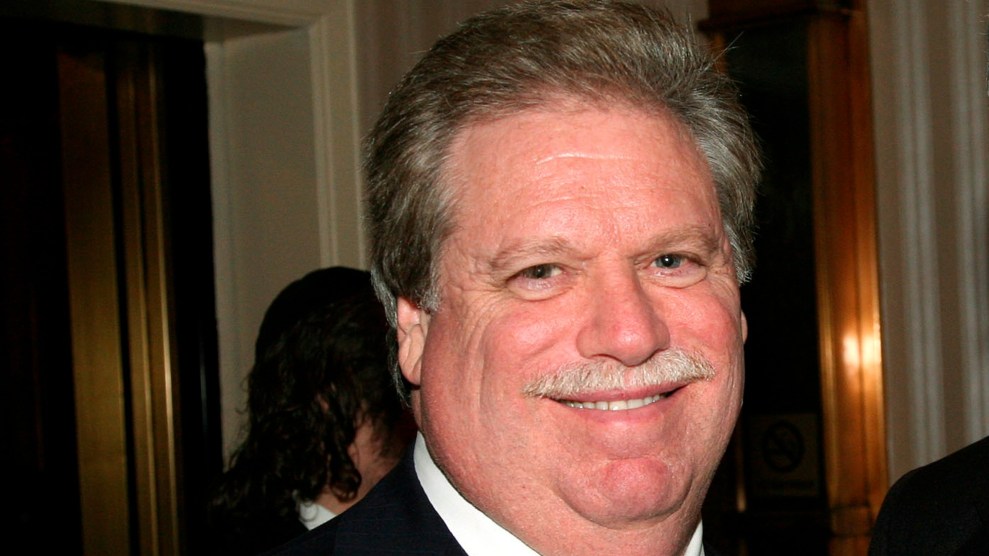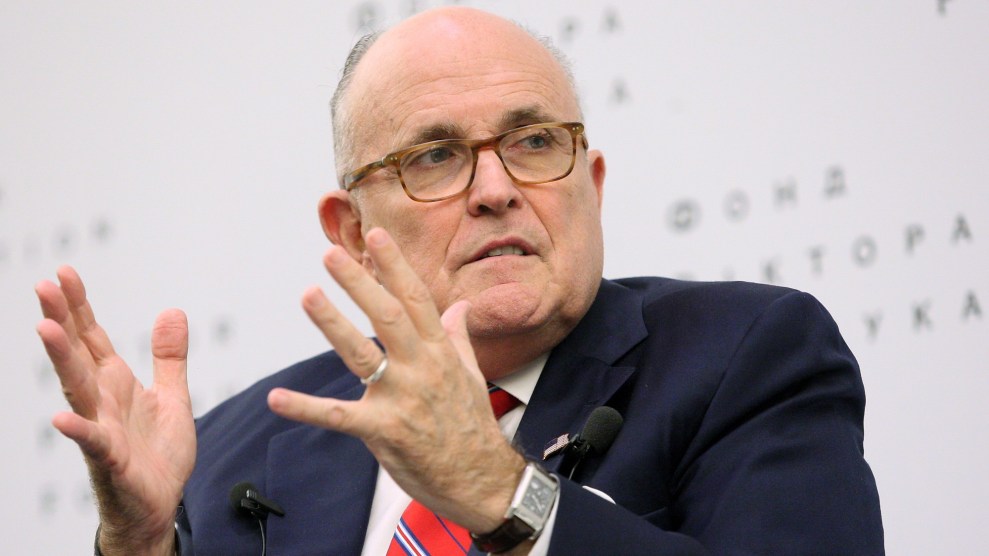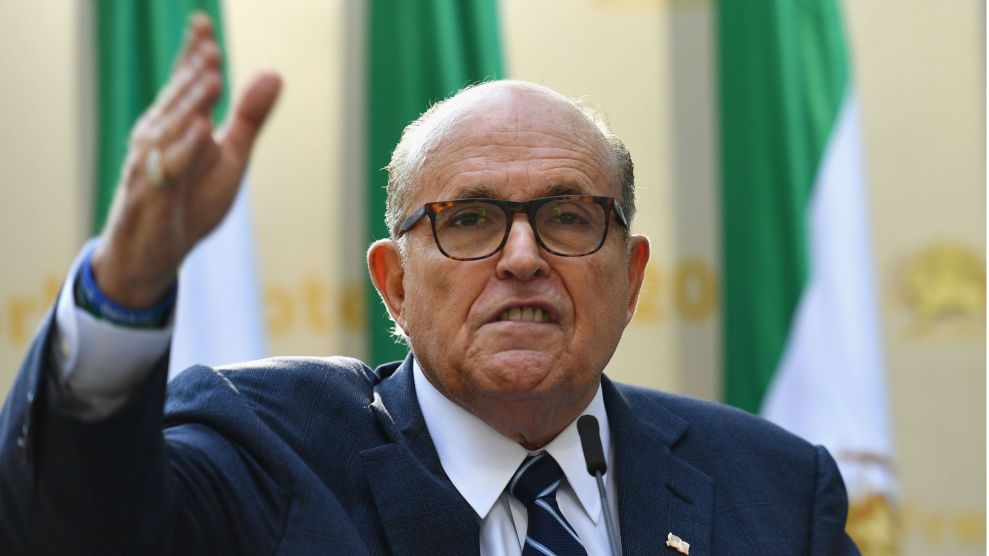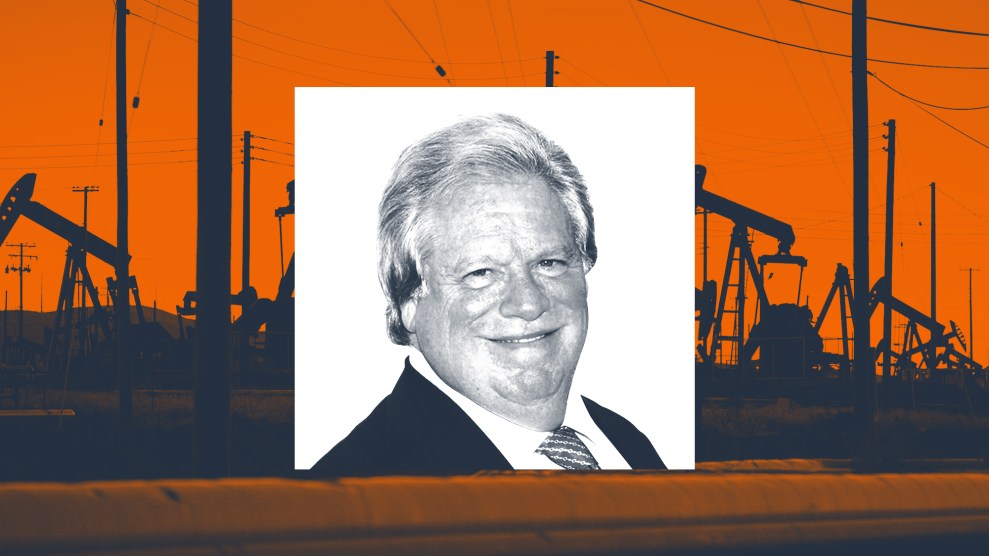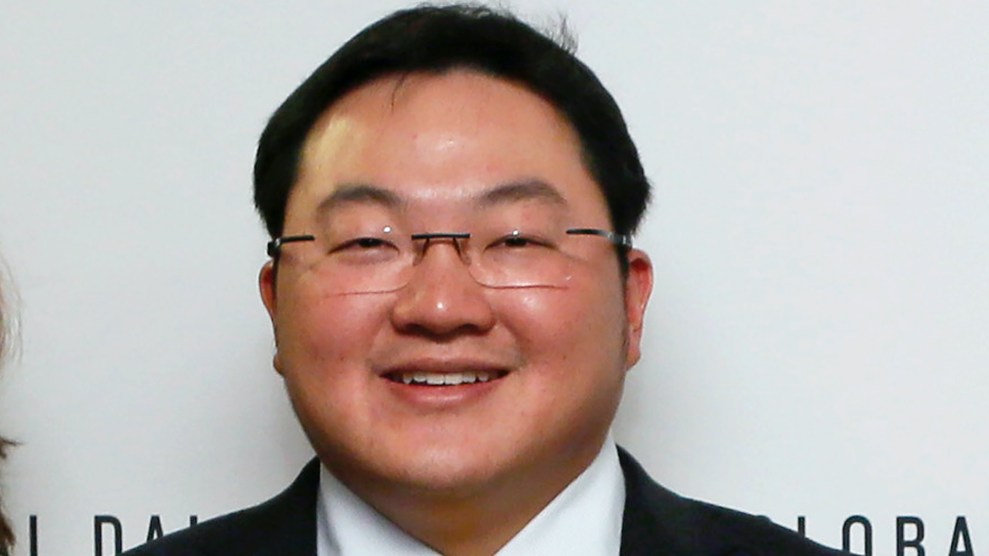
Jho Low on April 23, 2015, at the launch of the Global Daily website in WashingtonStuart Ramson/Invision for the United Nations Foundation/AP
In 2017, Jho Low was hiring. Low—a businessman suspected of acting as a key architect in the embezzlement of around $4.5 billion from a Malaysian state fund known as 1MDB—was looking for well-connected Americans who could make his legal problems go away. The US Justice Department had launched an investigation into the looting of the fund, a massive crime allegedly perpetrated at the direction of the country’s former prime minister, Najib Razak. Federal prosecutors had also moved to seize assets Low had stashed around the world, including a $120 million “super-yacht,” high-end real estate, and art.
What happened with Low says a lot about Washington, and Donald Trump’s Washington in particular. Some of the country’s most prominent Republicans, along with a throng of other top lawyers and PR specialists, lined up to offer Low help. “He was throwing off cash,” one person familiar with Low’s efforts to hire powerful allies said. “People flocked to him.”
Some prominent figures accepted Low’s money through elaborate workarounds to avoid the problem of potentially being paid with funds that the federal government was attempting to seize. They touted access to top administration officials, including Trump himself. But Low did not get what he was hoping for. The Justice Department did not drop its investigation. Low was indicted in 2018 for conspiring to launder money stolen from 1MDB. Last year, he gave up assets worth up to $900 million to settle the forfeiture cases against him, even as he remains a fugitive subject to criminal prosecution. In Washington, Low—an alleged mastermind in an international financial conspiracy—appears to have been something of a mark.
Other than his particularly deep pockets, Low’s experience was not abnormal. Trump’s election cut off traditional DC influence agents, opening a door for insiders brandishing real or exaggerated access to a president who flaunted his disregard for ethical norms. In the early days of Trump’s presidency, many foreign clients forked over big upfront fees to lobbyists who touted their connections but delivered limited results.
On Tuesday, Elliott Broidy, a former top Trump fundraiser and deputy finance chairman of the Republican National Committee, pleaded guilty to conspiring to violate the Foreign Agents Registration Act through his supposed efforts to assist Low on the 1MDB case. Broidy admitted that he accepted $9 million to lobby the Trump administration to end its 1MDB probe. Broidy paid a finder’s fee to Nicki Lum Davis, a GOP fundraiser who helped connect Broidy to Low. In August, Davis pleaded guilty to aiding and abetting FARA violations. Davis is represented by Abbe Lowell, a prominent defense lawyer whose clients include Jared Kushner and Ivanka Trump. As Davis’ attorney, Lowell in 2017 was involved in discussions about Low’s legal and lobbying efforts, according to people familiar with the matter. Lowell declined to comment.
Low’s payments went through a Hong Kong entity controlled by Low to a company created by Pras Michel, a musician and former member of the Fugees, who had helped connect Low to Broidy and took a cut. The funds then went to a limited liability company run by Broidy’s wife, a lawyer, and then into Broidy’s account, prosecutors say. Broidy also secured an agreement to receive a $75 million “success fee” from Low if the Justice Department dropped its 1MDB investigation within 180 days. The Justice Department eventually seized more than $73 million that Michel allegedly helped Low fraudulently funnel into American bank accounts to pay influential political figures to lobby the US government on 1MDB.
According to a court filing outlining charges against Broidy, his work for Low including an effort to set up a golf date between Najib and Trump, during which the Malaysian Prime Minister could “raise the resolution of the 1MDB matter with” Trump. But while Najib did eventually meet with Trump in the White House, the golf outing never occurred. The charging document notes that Broidy and colleagues “were unsuccessful in their efforts to have the 1MDB matters dropped.”
Low is a short and pudgy graduate of the University of Pennsylvania’s Wharton School, whose alleged role in helping Najib launder stolen 1MDB funds allowed him to live the life of an international playboy. According to the Justice Department, Low used stolen 1MDB funds to buy pricey art; gamble massive amounts in casinos; and make status-enhancing investments, including in a production company that helped finance the Oscar-nominated The Wolf of Wall Street. He cultivated relationships with celebrities like Leonardo DiCaprio, who starred in that film; Paris Hilton; and model Miranda Kerr, who Low reportedly dated. By mid-2017, due to the forfeiture proceedings, DiCaprio was in the process of turning over to the DOJ art by Pablo Picasso and Jean-Michel Basquiat that Low had given him. Kerr surrendered $8 million in jewelry she’d received from the financier. Low, however, remained flush with funds and eager to pay top dollar for help accessing the Trump administration and getting the Justice Department to drop its efforts.
Low hired several of well-connected lawyers to help him with his legal troubles. Former New Jersey Gov. Chris Christie, a Trump confidant, represented Low in the asset forfeiture cases. Marc Kasowitz, who at the time was also Trump’s personal attorney, and Bobby Burchfield, who has worked as an ethics adviser to Trump, have also acknowledged working for Low. Ed Rogers, a prominent GOP lobbyist, did work for Low, according to the Wall Street Journal. The Journal reported last year that the Justice Department was looking into whether Low laundered tens of millions of dollars through associates to pay legal advisers without the money being subject to forfeiture. The paper noted that there “is no indication that any of the people who ultimately received payments were aware the funds could have originated from money Mr. Low allegedly siphoned off from 1MDB.” Christie, Burchfield, and Kasowitz have denied impropriety in the how they were paid and have said their work was limited to legal advice. Rogers did not respond to a request from Mother Jones for comment.
Low claimed to have even higher-level help. In 2017, he told people assisting him with his legal issues that he had paid Rudy Giuliani—the Trump ally and former New York City mayor—around $10 million dollars for help on the 1MDB case, two people familiar with the matter said. “He was bragging about hiring Rudy,” said one person who heard Low’s claims. Mother Jones was unable to corroborate Low’s assertion that he had hired Giuliani, and Giuliani categorically denies it.
“Never met him,” Giuliani wrote in a text message last week. “[Low] never paid me. In any way directly or indirectly.” Giuliani reiterated that denial on Mark Levin’s radio show on Sunday, saying he had been asked about Low by multiple reporters. “I never met him. I never talked to him,” Giuliani said. “I didn’t get $10 million dollars from him.” Giuliani’s lawyer, Robert Costello, said in an email that “Giuliani did no work for Malaysia or [1MDB] or Low.”
Last December, Washington Post columnist David Ignatius reported that Giuliani, according to two unnamed attorneys, had “talked with Justice Department lawyers” about Low. The report said that Giuliani initially told the Post he did not recall such a conversation and a few minutes later added: “If they talked to me I told them he tried to retain us and my partners [at Greenberg Traurig] turned him dow[n].” In a text message to Mother Jones, Giuliani denied any DOJ meeting had occurred. “I didn’t meet with anyone about him,” he said. “It’s just not true.”
Since 2017, much of Low’s legal and public relations work has been handled through Kobre & Kim, a New York-based law firm that says it specializes in “complex cross-border disputes and investigations.” The firm registered with the Justice Department in October 2018 as an agent for Low. In its filing, Kobre & Kim did not include a contract with Low, a step required under FARA. The firm also offered an unusual explanation for how it receives compensation for its work for Low. “The registrant has not received funds from the foreign principal,” the firm said. “The registrant has received funds on behalf of the foreign principal.”
Kobre & Kim has since reported receiving $1.6 million from Sheikh Sabah Jaber al-Mubarak al-Hamad al-Sabah, the son of a former Kuwaiti prime minister. Sabah controls a bank where Low reportedly parked funds. Kobre & Kim has also received $1.1 million for its work for Low from Phengphian Laogumnerd, a Thai businessman with ties to Low. In its FARA filing, the firm described its work for Low as consisting in part of “public relations relating to the Malaysian rule of law and Malaysian government.”
The funds from Sabah and Lagogumnerd helped cover Kobre & Kim’s bills and payments the firm made to other law and public relations firms hired to help Low. Marathon Strategies, a PR firm founded by Democratic campaign operative Phil Singer, receives $55,000 per month. Reevemark, a Manhattan-based firm, reported receiving $125,00 per month. Other firms on the account include Schillings, a British law firm; Levick Strategic Communications, a New York crisis management firm; and an Australian public relations firm.
Kobre & Kim, which says on its website that other “lawyers regularly appoint us as special advocates for their clients in sensitive situations involving conflicts of interest,” is not widely known, but it does have high-level connections. Steve Kobre, a cofounder of the firm, met on July 16, 2019, with Attorney General William Barr, according to logs of Barr’s visitors the DOJ released under a Freedom of Information Act request by American Oversight, a nonprofit watchdog group. The meeting came a few days before the Justice Department seized bank accounts associated with Low. In a statement sent by a spokesperson for the firm, Kobre said he and Barr “did not discuss” Low or “any cases or matters at all.” Kobre said he and Barr, both graduates of George Washington Law School, met because “we are in the same alumni network.” The spokesperson did not answer other questions about Kobre & Kim’s work for Low.
Barr in 2019 received a waiver from the White House allowing him to oversee the Justice Department’s 1MDB investigations, despite his pledge to recuse himself from matters related to his former law firm, Kirkland & Ellis, which represents Goldman Sachs. In July, Goldman agreed to pay $3.9 billion to Malaysia to settle charges over its conduct in the 1MDB matter. On Tuesday, Goldman reportedly agreed to pay the US government $2.8 billion, and admit wrongdoing, to settle US charges related to its 1MDB work. Two former Goldman bankers also face criminal charges in the United States.
All of Low’s legal firepower could not stop his 2018 indictment by federal prosecutors in the Eastern District of New York. Those charges remain pending, even after Low agreed last year to settle the Justice Department’s civil forfeiture case, surrendering assets including “high-end real estate in Beverly Hills, New York and London; a luxury boutique hotel in Beverly Hills; and tens of millions of dollars in business investments,” according to the department. The settlement, however, allowed $15 million of the seized funds to be set aside to pay Kobre & Kim, Christie, and another law firm, Lowenstein Sandler, that did work for Low. Low remains a fugitive. According to Malaysian officials, he is living in China, though the Chinese government denies that.
What did Low get for his money? On October 6, 2017, Broidy met personally with Trump, and he later claimed that he had lobbied the president on 1MDB. But in a recent court filing laying out charges against Broidy, prosecutors said Broidy “did not raise the 1MDB matters during the meeting, but represented to Davis that he had, understanding that Davis would communicate that information” to Low.
Low figured out by the fall of 2017 that some of his advisers weren’t doing much for him, according to George Higginbotham, a former Justice Department official who has admitted to helping Pras Michel move Low’s money into the US to pay Broidy. During a November 2018 hearing connected to his own guilty plea on bank fraud charges, Higginbotham told a federal district court that he had traveled to China with Michel to meet with Low, who was “reluctant to send any more money.” Low, Higginbotham said, “was unhappy with the money that had been sent to the US because nothing had—no action had taken place on the resolution of the DOJ matter regarding 1MDB.”

